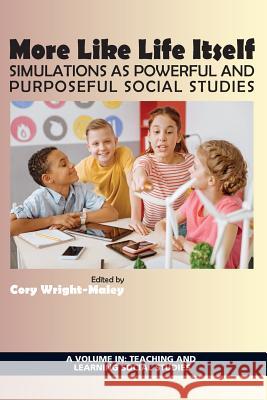More Like Life Itself: Simulations as Powerful and Purposeful Social Studies » książka
More Like Life Itself: Simulations as Powerful and Purposeful Social Studies
ISBN-13: 9781641133203 / Angielski / Miękka / 2018 / 322 str.
John Dewey wrote in multiple places that education should be an experience of the content and processes of life itself. Too often, social studies is taught in a way that tells students about real-life, but fails to engage them in the process of life for which Dewey advocated. The core purpose of simulations is to reflect the processes, events, and phenomena expressed in a variety of real-life domains. They engage students in these reflections of real life meaningfully, as active agents who have the power to make decisions that impact the direction of events and that lead to both intended and unintended consequences. Because of the nature of simulations, students who participate in them are able to build their capacities to think in complex and critical ways. Today, despite the growing evidence that simulations have an important role to play in the teaching of social studies, they remain an underutilized and undervalued approach to the discipline. One of the key obstacles to their widespread adoption is the limited availability of training resources available to social studies teachers. Teachers need support to develop a new vision of social studies teaching and learning coupled with practical guidance necessary to implement simulations effectively. This volume provides teachers with both. When teachers are able to weave simulations effectively into the fabric of social studies teaching and learning, they help to promote social studies experiences that are both powerful and purposeful. They offer students an experience of the discipline that is, indeed, More Like Life Itself.











